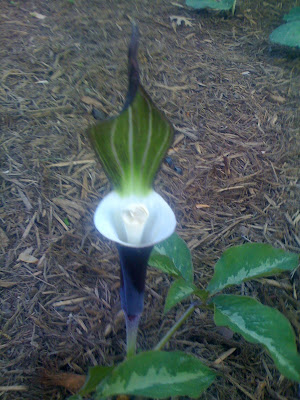
Suddenly, the nights are noticeably longer and there are, in fact, leaves falling on the lawn. The
CSA is delivering acorn squash, and apples, and mushrooms and I'm thinking of soups. I've been able to turn off the air conditioning and open up the windows. In a few days, the Wheel of the Year will have turned all the way around to Mabon, the second of the three Harvest Feasts. (For the first time in years, I'll be out of town, away from my amazing circle of women, celebrating on my own, due to a court schedule beyond my control. I'm working on a plan to commune with some new nature so that I don't wind up making a sad little altar in my hotel room and feeling (too!) sorry for myself.)
Having three harvests is a pretty neat thing. It goes back, I think, to a time when monoculture was unheard of. If you grow different fruits and vegetables and raise different animals (as any sane people would do unless they lived in an incredibly hostile environment), they mature at different times. And you have different harvests, which come in an almost rolling cascade: radishes and asparagus giving way to too many tomatoes, the tomatoes giving way to too many zucchini, the zucchini giving way to the first autumn squashes and winter greens. In my herb garden, the tarragon is finished and the basil is warning me that if I don't "get around" this weekend to making it into pesto to be frozen in ice cube trays for the winter, I'll be out of luck. One thing about harvests is, when the food is ready to be picked, it's ready to be picked. We have to stop, pay attention, do what the plant requires of us when the plant requires it. That's part of what it means to be "in relationship" with the land.
It's traditional among many Wiccans to view this time of year as a time when we "harvest" other things, as well. If you set goals for yourself last Samhein, and if you've worked on those goals and been blessed with good health and good luck, you may be close to reaping the rewards of your work, whether spiritual, magical, financial, emotional, physical, or educational. And, if you're not, now's a good time to figure out what you can salvage and what happened to get in your way, all in preparation for the final harvest feast of Samhein.
I find it a good time of year, as well, to take stock. What have you got to carry you into the cold and difficult part of the year? What might you need to focus on now, that may have gotten lost in the heat of summer, the long days laboring in the threshing field?
If you consider yourself to be a member of a
Nature Religion, I'd like to suggest that one of the areas you consider is your relationship with Nature. Do you have a relationship with -- not just a vaguely benign feeling for -- your landbase, your local watershed, some particular plants, or animals, or places near to where you live? If so, what can you do to improve that relationship? We Witches say that power follows attention. If not, what can you do to begin to actually live your Nature Religion? We Witches say that power follows attention.
By now, you know that I don't believe that, "Well, but I live in the city," is a good excuse. Most Pagans in America today live in cities. And the landbase of every city in America is crying out for relationship with its humans. You don't have to have a yard.
As I've noted before, cities are full of deserted spaces, almost custom made for a Witch's attention and connection. (And devotee of Hers that I am, I can't help but mention that it is in just such deserted, liminal spaces that Hecate often resides.) In
Last Child in the Forest: Saving Our Children from Nature Deficit Disorder,
Richard Louv writes about the work of
Robert Michael Pyle, who described his relationship as a child with "a century-old irrigation channel near his home. The ditch . . . was his 'sanctuary, playground, and sulking walk,' his 'imaginary wilderness, escape hatch, and birthplace as a naturalist.'"
Louv:
"These are the places of initiation, where the borders between ourselves and other creatures break down, where the earth gets under our nails and a sense of play gets under our skin," Pyle writes. These are the "secondhand lands, the hand-me-down-habitats where you have to look hard to find something to love." Richard Mabey, a British writer and naturalist calls such environments, undeveloped and unprotected, the "unofficial countryside." Such habitats are often rich with life and opportunities to learn; in a single decade, Pyle recorded some seventy kinds of butterflies along his ditch.
What "unofficial countryside" is your countryside? The crisp Fall days are perfect for walking around, looking, and listening. Tell me what you find.
Picture found
here.







